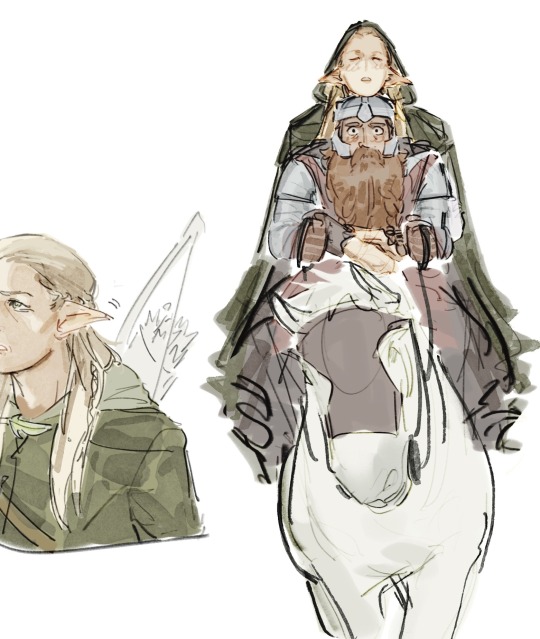Text
I’m fine, I’m fine, it’s totally cool that the last galdor (spoken charm particularly used, under various names, in the Dark Ages in the European North Atlantic) Gandalf lays down is “You cannot pass.” And that the SECOND to last galdor Gandalf lays down is to protect the abandoned Bill the Pony.

1K notes
·
View notes
Text
yeah tolkien probably didn’t anticipate how bad he messed up by leaving the seduction of mairon so vague…….like if he’d just explained……..did melkor have good campaign ads? did he show mairon a 300 slide powerpoint presentation on why Evil is the Way of the Future? I’m sorry mr tolkein but bc you never specified im free to assume that mairon had a big embarrassing eternal crush on melkor and they held hands a lot and also probably the powerpoint happened at some point. you can’t stop me.
3K notes
·
View notes
Photo
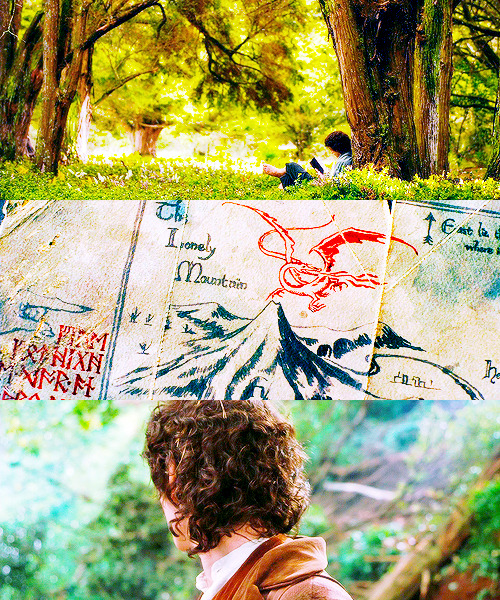


All you have to decide is what to do with the time that is given to you.
8K notes
·
View notes
Text
The more despair I endure in life, the more I love Frodo. I'm just. I'm so glad that Tolkien wrote him like that. He was a hero and it broke him. He was given too much to carry. The circumstances were dire, everyone was doing the best they could, and Frodo tried so hard, for such a good cause, and he...broke. And the narrative has pity for him, the characters show him kindness. Even after victory, his hurts did not heal, and it isn't considered his fault. He must go to the undying lands, to seek out peace there. In universe, he is forgiven for being human - don't be pedantic - and his great torment is recognized. He fell. He could not have done it alone. He is still a hero.
And, I think that's important.
60K notes
·
View notes
Text
Someone asked me to expand a little on a topic that was buried down in a big chain of reblogs, so I'm doing that here--it's about the use of the archaic "thee", "thou", "thy", etc. in LOTR and what it tells you about characters’ feelings for one another. (I am NOT an expert on this, so it's just what I've picked up over time!)
Like many (most?) modern English speakers, I grew up thinking of those old forms of 2nd person address as being extra formal. I think that's because my main exposure to them was in the Bible ("thou shall not...") and why wouldn't god, speaking as the ultimate authority, be using the most formal, official voice? But it turns out that for a huge chunk of the history of the English language, "thee," "thou," and "thy" were actually the informal/casual alternatives to the formal "you", “your”, “yours”. Like tú v. usted in Spanish!
With that in mind, Tolkien was very intentional about when he peppered in a "thee" or a "thou" in his dialogue. It only happens a handful of times. Most of those are when a jerk is trying to make clear that someone else is beneath them by treating them informally. Denethor "thou"s Gandalf when he’s pissed at him. The Witch King calls Éowyn "thee" to cut her down verbally before he cuts her down physically. And the Mouth of Sauron calls Aragorn and Gandalf "thou" as a way to show them that he has the upper hand. (Big oops by all 3 of these guys!)
The other times are the opposite--it's when someone starts to use the informal/casual form as a way to show their feeling of affection for someone else. Galadriel goes with the formal "you" all through the company's days in Lórien, but by the time they leave she has really taken them to heart. So when she sends them a message via Gandalf early in the Two Towers, she uses "thee" and "thou" in her words to Aragorn, Legolas and Gimli because now they're valued friends and allies. And--this is the big one, folks, that was already alluded to in my previous post--Éowyn starts aggressively "thou"ing Aragorn when she is begging him to take her along as he prepares to ride out of Dunharrow. She is very intentionally trying to communicate her feelings to him in her choice of pronoun--an "I wouldn't be calling you "thee" if I didn't love you" kind of thing. And he is just as intentionally using "you" in every single one of his responses in order to gently establish a boundary with her without having to state outright that he doesn't reciprocate her feelings. It's not until much later when her engagement to Faramir is announced that Aragorn finally busts out "I have wished thee joy ever since I first saw thee". Because now it is safe to acknowledge a relationship of closeness and familiarity with her without the risk that it will be misinterpreted. He absolutely wants to have that close, familiar relationship, but he saved it for when he knew she could accept it on his terms without getting hurt.
So, you know, like all things language-based...Tolkien made very purposeful decisions in his word choices down to a bonkers level of detail. I didn’t know about this pronoun thing until I was a whole ass adult, but that’s the joy of dealing with Tolkien. I still discover new things like this almost every time I re-read.
2K notes
·
View notes
Text
The voyage west at the end of Return of the King is extremely funny to me, because just look at who's on board. You've got:
Frodo Baggins, hero of the Shire, in need of healing but also excited to see Valinor and meet the legendary elves who live there, a gentle soul
Elrond Halfelven, as kind as a summer, looking forward to peace west of the sea, probably wants to go chill out in a cottage with his wife for the next thousand years
Which seems fine. And then we get to everyone else.
Gandalf, cheeky bastard who's gotten so used to being a weird old wizard in Middle-Earth that's he's forgotten what Maia are supposed to act like, will immediately cause problems
Bilbo Baggins, noted storyteller, definitely planning to break into Aule's halls to see his dwarf friends, will ask all the elves weird questions and then sing about their lives and deaths in front of them, will immediately cause problems
Galadriel, who came to Aman half for Celebrian and Elrond's sake and half to taunt all her cousins about being the only one of them to survive the First Age, enjoys causing problems, will immediately cause many problems
(Also, to be clear, these are not three isolated problem-causers, they absolutely spent the entire trip to Valinor actively planning to give Amanyar society and the Valar an aneurysm.)
I just love the idea of Elrond, now reunited with Celebrian, and Frodo happily having tea with Elwing and Earendil, with nothing to interrupt them but the gentle sounds of the tides.
Meanwhile Galariel, Bilbo, and Gandalf are collectively bullying Mandos into releasing Maglor Feanorian from the halls because:
Bilbo wants to read him his translation of the Noldolante, which is written as a cheery Hobbit drinking song
Elrond always complained about how Gandalf and Maglor were both insufferably vague about advice and Gandalf needs to make sure he's more infuriating than Maglor as a matter of his wizardly pride
He still owes Galadriel money
1K notes
·
View notes
Text
i literally have a lotr sb so idk why i'm bringing this to main (ik why it's just not the vibe for that blog) but god i am once again going insane about the song of durin. but still the sunken stars appear in dark and windless mirrormere. idk. god. the hope the grief the love the loss infused into only six stanzas. the beauty of what once was the terror of what is now the undying conviction it will be better in the future, because it has to be better. and maybe it won't be as good as it used to be but it doesn't need to. something about transformative love and transformative grief and how they're the same force. a driving force. grief is endless but so is love. love is endless but so is grief. dwarven wealth that lies not in their gold and gems but in their hearts full of love that they carry from one ruined ancient city to the next to the next like portable treasuries. i'm going to kill myself and make tolkien watch
11 notes
·
View notes
Text
Beleriand is gone and Tol Himling remains. No one lives there, few dare to venture close. Even years later, the fortress feels like bitter grief and pained endurance.
The remaining Noldor– and there aren't many of them by the Second Age– start sailing there. It's not far from the shore; an easy enough journey, even for someone with little seafaring experience.
One day, someone– no one is sure who– takes one of the broken pieces of Himling's walls, carves Maedhros's name into it, and sets it as a tombstone. After that, more graves appear, slowly at first, then more quickly. Old battle-songs and tributes to the dead are carved and painted into the walls. Soon, the meadow around the old fortress is full of memorials, some made from the ruins, others lovingly crafted and brought from the mainland. For all the Noldor fought amongst themselves in the First Age, now their headstoens stand together. In the cemetery, the House of Finwe is united in death as it never was in life. Graves for Feanor and Fingolfin sit side-by-side in a sorrowful peace neither lived to see.
Himring stood on an icy mountaintop where the snow never melted, but Tol Himling does not. One spring the barren meadow blooms, red poppies and blue forget-me-nots. It flowers every year after, new hues and blossoms appearing annurally until the graves are surrounded by a colorful sea of flowers.
Not many Noldor choose to sail west– most that go back to Valinor go in death– but those that do leave tokens on Himling before they leave, broken weapons and battered armor. Maybe they do it to leave something with the dead who may never return from Mandos. Maybe they do it because like the dead, their fight in Middle-Earth has ended.
Men who sail by the island– always by, never to– are very sure that there are ghosts there. To them, the place seems strange and misted, and every figure there looks like a shade. They speak of a golden-haired warrior who spends hours talking to some of the graves, a king who dutifully cares for the tombstones, wiping away dust and moss, the strange dark-haired figure who comes every year to sow wildflower seeds. But those aren't the spirits of the Noldor dead. Only those who would remember them.
429 notes
·
View notes
Text
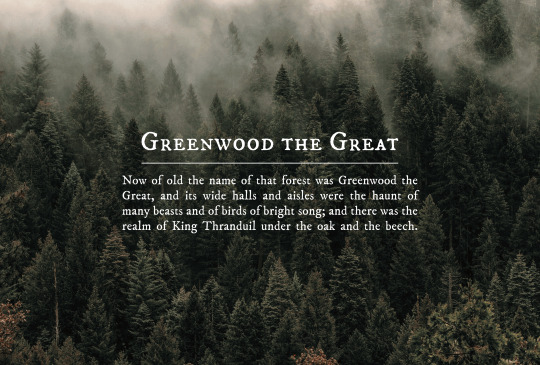
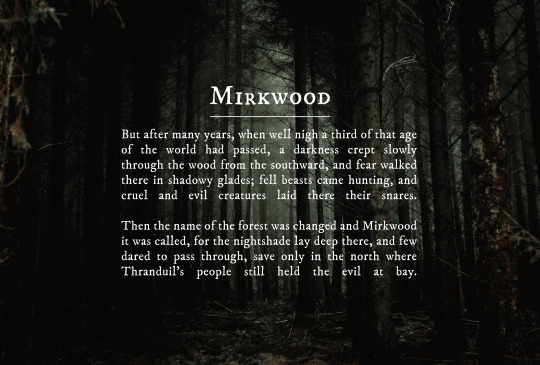
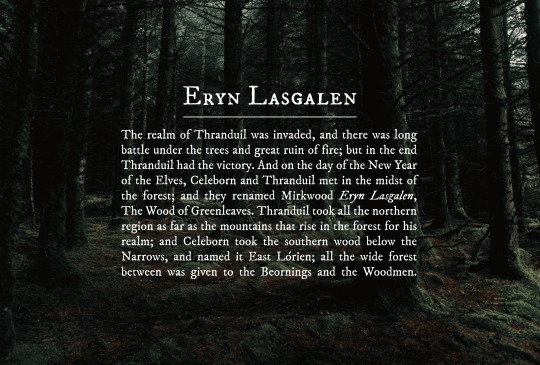
ATLAS OF ARDA ↣ MIRKWOOD
“There lies the fastness of Southern Mirkwood,” said Haldir. “It is clad in a forest of dark fir, where the trees strive one against another and their branches rot and wither. In the midst upon a stony height stands Dol Guldur, where long the hidden Enemy had his dwelling. We fear that now it is inhabited again, and with power sevenfold. A black cloud lies often over it of late.”
336 notes
·
View notes
Photo

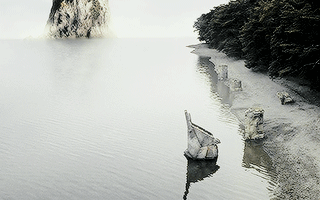

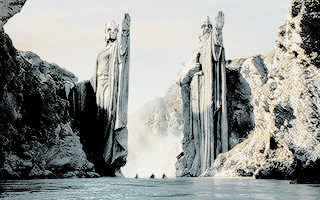


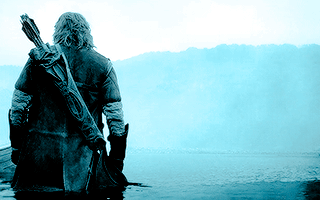

“The world is indeed full of peril, and in it there are many dark places; but still there is much that is fair, and though in all lands love is now mingled with grief, it grows perhaps the greater.”
6K notes
·
View notes
Text
i took elvish in school and i fucking hated it. the teacher was like 700 years old and he'd like take us on field trips to sit on the banks of babbling brooks and watch the fall of sunlight through the leaves. my friends in spanish class were like conjugating verbs and shit and meanwhile i was in an old-growth forest being overcome with awe at the sight of a majestic stag. like uhh yeah mr autumnheart when are we gonna learn like any grammar "listen to the murmur of the wind in the treetops, and you shall find the grammar you seek" like fuck dude your pedagogy leaves much to be desired
44K notes
·
View notes
Text
aragorn's terrible, horrible, no good, very bad week:
the fellowship breaks on his watch
forced to choose who to follow
runs over 200 kilometers in under four days
thinks merry and pippin are dead
meets the reborn gandalf (a rare win), immediately has to do a 180 and ride to edoras
immediately after that needs to ride to battle
takes part in a battle which takes place over the whole night
gets maybe 20 hours of sleep over the course of the whole week
and, I cannot stress this enough, this is all still very far from over
5K notes
·
View notes
Text
saw someone say they thought balrog and glorfindel were glup shittoesque words I'd made up on one of my posts and for a moment I was so shocked and offended that I forgot that the average person does not, in fact, carry encyclopedic knowledge of tolkien elf genealogy in their head
212 notes
·
View notes
Text
do you ever think about the sheer grief that pervades so much of fëanor's story in general...? his grief and his resentment towards míriel seem to make up such an integral part of his being and what drives him as a whole. for him, even the mere suggestion that something might be perceived as an insult against his mother is just too much to handle. in a sense, he's still so obsessed with protecting her honor, even when she has long since passed into the halls of mandos and vairë.
there's just this profound sense of loss that makes so much more sense when you think about fëanor as an individual who is still grieving the loss of his mother and grappling with the consequences of his father's actions.
in the The Shibboleth of Fëanor from The Peoples of Middle-Earth, there's this lovely little passage that tells fëanor's story a bit differently, amongst a description of his Linguistics Snobbery: it describes míriel's death (which, notably, does not occur soon after his birth, but a bit later on) as a 'lasting grief to fëanor', which influenced many of the disastrous actions he took later on. when she dies, fëanor takes guard of her sleeping body and hröa, for a time.
to me, it's such an accurate depiction of grief: it's not something that fëanor struggles with for a time and then forgets, and it's not beautiful and tragic: it's ugly, it's life-long, and it cuts fëanor so deeply that he never fully recovers from it. it's a shame that this particular narrative of grief doesn't get as much attention as it should; people tend to dismiss fëanor as unhinged and nothing more, but, like... grief makes you do crazy things and it changes you so much. it doesn't justify what fëanor does throughout the silmarillion, of course, but it explains a great deal.
915 notes
·
View notes
Text
From a Watsonian perspective the last scene of The Hobbit is kind of really sad, actually?
Because. Listen. So the last scene is this slightly expository "where-are-they-now" wrap-up, right? The ending goes into a summary of Bilbo's life post-adventure, and then zooms back in to a particular scene of Gandalf and Balin visiting Bag End and telling Bilbo what happened to the OTHER people who were involved in the adventure. It makes good structural sense.
BUT... From an in-universe perspective, we know that Bilbo didn't finish his book--or at least didn't stop working on it--until after the Council of Elrond, if then. In fact, as he's leaving the Shire, he tells Gandalf that he's thought of a nice ending for it: "And he lived happily ever after to the end of his days"--a line which does more or less appear in the last chapter of The Hobbit, but immediately before the actual final scene.
Therefore, there's a real case to be made that Bilbo wrote that last scene after coming to Rivendell--or, in other words, after visiting the Lonely Mountain and finding Balin had gone away and gone missing. It's even possible that he and/or Frodo (who we know to have heard about Balin's visit to the Shire) added that scene as the ending after learning about Balin's death--but in any case, we know that Bilbo knew, when working on the end of his book, that something bad had most likely happened to Balin.
Which means I can imagine Bilbo--missing his friend, wondering about his fate, maybe also living in the uncertainty of Frodo's quest and the gathering darkness--very deliberately choosing to end his book there (or else Frodo, finding the scene in his notes, choosing to insert it there as an expression of Bilbo's wishes). It means that there's maybe another reason that The Hobbit ends on that final image, one of Bilbo and Balin and Gandalf sharing talk and pipes in Bag End. They're together, prosperous, safe and well and happy...and on that note, the curtain falls.
'Thank goodness!' said Bilbo, laughing, and handed him the tobacco-jar.
That is where the story ends, and where the figures in it are finally left; and I think there's something to be said about the fact that that's where Bilbo drew the curtain. As if, in a way, by leaving off there, that evening is left suspended forever--so that, in these pages at least, Balin is still at ease with his friends in Bag End, in the peace of an autumn evening in the Shire and undisturbed by darkness.
4K notes
·
View notes
Text
Ways to poetically say "forever" if you're an elf
"Until the stars go out": classic from Cuiviénen, never lost its charm.
"When Laurelin frosts": rapid decrease in popularity for obvious reasons.
"While Telperion has leaves": rapid decrease in popularity for obvious reasons.
"Unto world's end": used once and very rarely thereafter.
"When the sun freezes": nothing quite like a reprise. Rapid decrease in popularity for obvious reasons.
"Until day comes again": popular in Angband, with varying sincerity.
"While Gil-Estel shines": If a fuckhuge winged dragon couldn't stop it from shining, what could?
"Until the last ship sets sail into the West": 95%+ of uses were by the guy building the dang ship.
"When Fëanor apologizes": What exactly he is apologizing for is sometimes included, but largely deemed unnecessary.
"When the world is mended": steadily increasing in popularity and decreasing in sincerity.
3K notes
·
View notes
